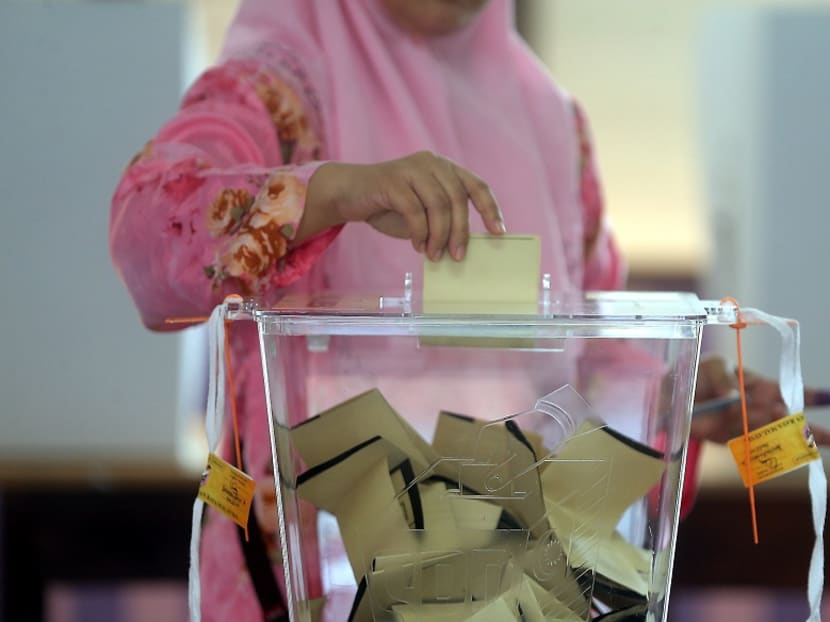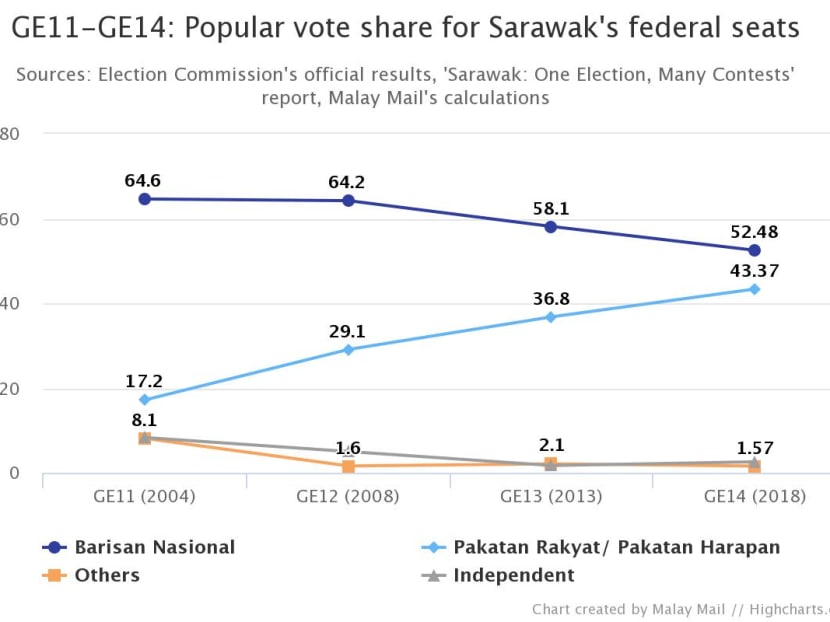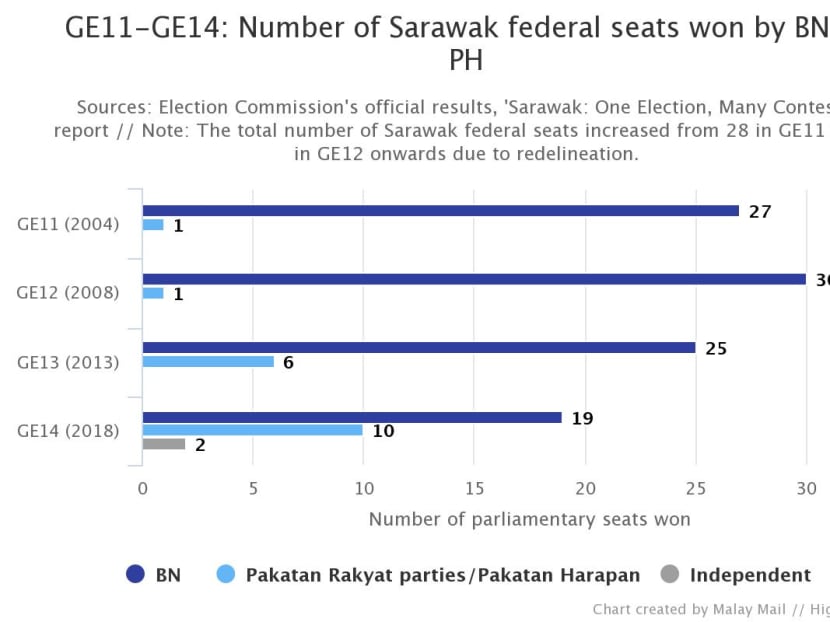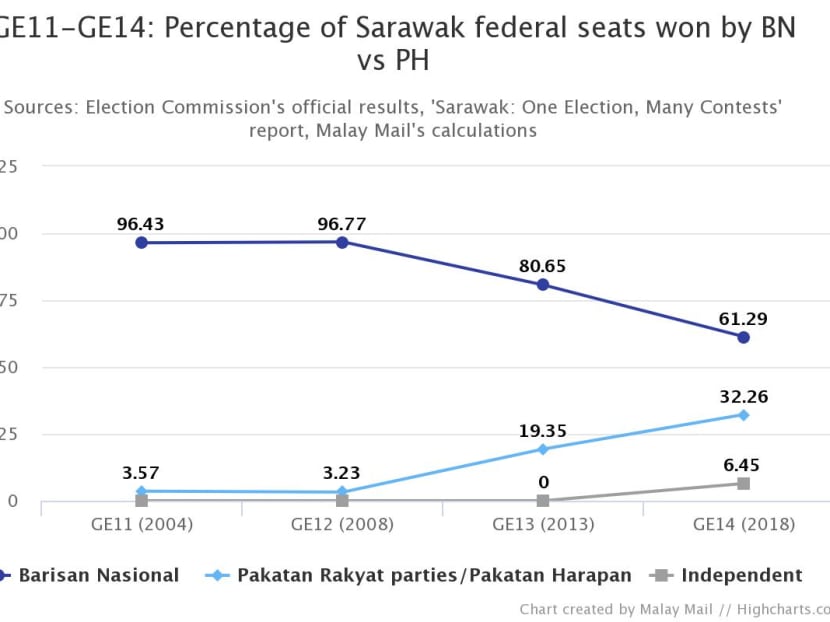BN may lead popular vote in Sarawak, but can it keep the state?
KUALA LUMPUR — Barisan Nasional (BN) may have kept its popular vote in Sarawak amid a crushing electoral defeat nationwide, but analysts said the coalition’s grip on the state popularly referred to as its “fixed deposit” is no longer assured.

A woman casting her ballot during the May 9 general election. Sarawak was previously known as a 'fixed deposit' state that helped Barisan Nasional retain power, but is this still true today?
KUALA LUMPUR — Barisan Nasional (BN) may have kept its popular vote in Sarawak amid a crushing electoral defeat nationwide, but analysts said the coalition’s grip on the state popularly referred to as its “fixed deposit” is no longer assured.
In the just-concluded 14th general election, BN’s popular vote for the federal seats in Sarawak was at 52.48 per cent based on Malay Mail’s calculations, possibly its lowest-ever there.
The Pakatan Harapan (PH) coalition’s vote share there was 43.37 per cent, the closest it had ever come to BN’s vote share in the last four general elections.
If the vote share of the two independent candidates who won Julau and Lubok Antu federal seats are added in to PH’s, it would hit 45.18 per cent.
BN’s popular vote has been eroding since 11th general election in 2004 where it won 64.6 per cent of the popular vote, before slipping further to 64.2 per cent five years later and dropping further to 58.1 per cent in the 2013 national polls.
At the same time, the then Opposition had increasingly improved its voter support in Sarawak, leaping from 17.2 per cent in GE11 under DAP to 29.1 per cent in GE12 as PKR-DAP-PAS, and further narrowing the gap to hit 36.8 per cent of the vote share by GE13 as Pakatan Rakyat.

While still landing a win at 61.29 per cent or most of the 31 federal seats with its GE14 haul of 19 seats, BN ceded a total of 12 seats — 10 to PH and two additional seats to independent candidates who later joined them.
This is a further slide from GE13, when BN had a relatively comfortable win of 25 seats against then Pakatan Rakyat’s six seats.
This is also a far cry from GE12 and GE11, when BN kept an iron grip on Sarawak voters and only lost one seat on both occasions.

Universiti Kebangsaan Malaysia’s Faisal Hazis said BN’s weaker performance in the Sarawak federal seats was due to a combination of factors such as infighting, wrong choice of candidates, and national issues such as BN’s former chairman Datuk Seri Najib Razak’s leadership and 1Malaysia Development Berhad being played out in urban seats.
“The power of BN in Sarawak is quite strong. Why, 19 out of 31 seats is quite good relative to most of BN, but at the same time, we don’t call it fixed deposit because the fact that the Opposition could win 12 seats is quite unthinkable,” the associate professor told Malay Mail, saying that the two-digit win was quite an “unprecedented” result.
Mr Faisal noted that the two traditional BN strongholds of Selangau and Lubok Antu were suddenly won by the state Opposition after BN incumbents were dropped as candidates, while BN also lost Julau because of infighting, adding that DAP won the two Chinese seats of Sarikei and Miri unexpectedly despite previous concerns about its candidates.

Unlike Sabah — also known previously as BN’s fixed deposit state — which experienced intense contest where about half of the 25 federal seats there had four-corner fights, Sarawak had mostly two-corner and three-corner fights for its 31 parliamentary seats.
And while Sabah saw several BN candidates who had previously held positions as minister and deputy minister fall amid a nationwide push against the coalition, many of their counterparts in Sarawak managed to retain their seats with massive vote majorities.
For example, BN’s Datuk Seri Wan Junaidi Tuanku Jaafar retained his Santubong federal seat with a whopping 19,485 vote-majority; Datuk Seri Fadillah Yusof kept Petra Jaya with a massive 15,017 vote-majority; while Datuk Seri Nancy Shukri had a 12,328 majority in Batang Sadong.
Like the former three who had held federal minister posts, fellow BN and Cabinet colleagues Datuk Seri Rohani Abdul Karim and Datuk Seri Richard Riot defended the Batang Lupar and Serian seats respectively with a 10,277 vote-majority and 9,905 vote-majority, while Datuk Alexander Nanta Linggi who was formerly a deputy federal minister kept Kapit with a 10,479 vote-majority.
But Associate Professor Jeniri Amir from Universiti Malaysia Sarawak, said these BN leaders who previously held ministerial positions are now merely federal lawmakers who will sit as the federal Opposition in Parliament.
“They win big, they won the battle, but they lost the war,” he told Malay Mail.
He acknowledged that candidate popularity is also important in Sarawak, but said voters there no longer looked at personality or party during GE14, and were voting more to “change the government” instead.
Assoc Prof Jeniri contrasted Sarawak’s being relatively politically stable with Sabah’s more politically “volatile” situation where the state government has changed hands several times in the past.
“The mindset of voters is different for Sabah. They are used to changes in government, so nothing new to them, but Sarawak — this is the first time they have voted with this kind of voting pattern,” he said, having noted the 100 per cent jump by the state Opposition from six seats in GE13 to 12 seats (together with the independent candidates) in GE14 and the narrowing in popular votes.
No more safe deposit
Assoc Prof Jeniri said BN suffered defeat not only in the usual urban areas in Sarawak, but also in the suburban and rural seats, attributing it to the pleas for basic infrastructure such as clean water, electricity, roads and native land rights that had allegedly fallen on “deaf ears.”
“They (BN) promised a lot of everything, election after election, they overpromise but underdeliver. That was more or less a protest vote for rural voters,” he said.
He noted that the fall of BN candidates in seats such as Saratok and Lubok Antu shows that voters have lost confidence in the coalition in seats where the Iban and Bidayuh communities are dominant and “once regarded as fixed deposits.”
Like Assoc Prof Jeniri, independent researcher Andrew Aeria also said BN can no longer consider Sabah or Sarawak as its fixed deposit states.
“Both at the state as well as the federal level, if you compare it with 2013, there’s a shift in terms of voting percentage. And you look at the number of seats won by PH, there has been a shift, so one can’t simply assume Sabah and Sarawak are fixed deposits anymore.
“Also there’s a new dimension, a lot of these people voted for BN because they thought it was the only one who could bring the development. Now you have a new PH government that can also bring development. The equation has changed,” he said.
What lies ahead for the race to rule Sarawak?
The next Sarawak state elections is due to be held latest by 2021 which is just a few years down the road, but nothing seems certain anymore in the country’s largest state known as the “Land of the Hornbills.”
Assoc Prof Jeniri said BN will very likely be in for a very close fight in the next Sarawak elections, but said it was possible for the coalition to retain power due to rural seats and the Malay Melanau seats that tend to support Sarawak BN’s largest party PBB.
“The coming election will be very, very tough for BN including PBB because the mentality of the people now is to vote for PH, which was opposition during that time. Now with PH in government, they will be more daring, will be willing to change,” he said, adding that PH may win more seats as they are now in power at the federal level and will have more resources and machinery available.
“The political ballgame is no longer the same and the political landscape has changed. BN has to change and adjust, otherwise they will become irrelevant and a dinosaur and become history like what happened to Umno and BN in Peninsula,” he cautioned.
Mr Faisal said: “In the case of Sarawak, it is a BN state and BN in the state is still strong, but based on the last election, it’s seriously being contested and it could be seriously challenged in the next election.”
With Sarawak’s state elections held apart from the rest of Malaysia’s, Mr Faisal said PH was expected to bring its resources there, but said the coalition will have to not only push a narrative of change but also provide a strong Malay leadership and strong candidates if it wants to win.
“Currently there is just a vacuum in Malay leadership (in Sarawak),” he said, contrasting it to the strong leadership provided by PH’s Datuk Seri Mukhriz Mahathir and Datuk Seri Shafie Apdal in Kedah and Sabah during GE14. MALAY MAIL






